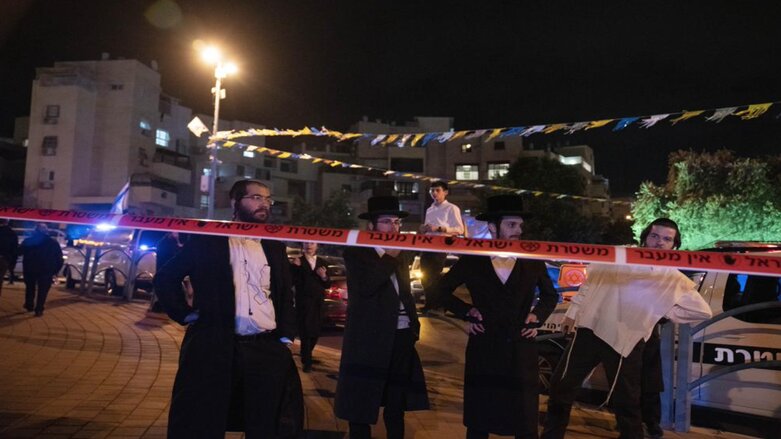US condemns terror attack in Israel following spate of assaults that began with ISIS

WASHINGTON DC (Kurdistan 24) – Israel has experienced a series of lethal terrorist attacks over the past month and a half. The most recent attack occurred on Thursday, which marked Israel’s Independence Day, its 74th since its foundation in the wake of World War II.
Three Israelis were killed in Thursday’s assault, in which the attackers used axes and knives. Four other Israelis were wounded, two of them severely.
“We vehemently condemn the terrorist attack,” US Secretary of State Antony Blinken said in a written statement. “This was a horrific attack targeting innocent men and women and was particularly heinous coming as Israel celebrated its Independence Day.”
“We remain in close contact with our Israeli friends and partners and stand firmly with them in the face of this attack,” Blinken concluded.
The two Palestinians who carried out the assault are still on the run. As of early Friday, a massive manhunt was still underway. Israeli authorities have identified them as As’ad Al-Rafa’ani, 19, and Sabhi Abu Shakir, 20, from the West Bank town of Jenin.
No group has claimed responsibility for the attack on the central Israeli city of Elad, which is located east of Tel Aviv and just three kilometers from the West Bank. Its residents are predominantly ultra-orthodox.
The head of the Palestinian Authority, Mahmoud Abbas, condemned the attack. “The killing of Palestinian and Israeli civilians only leads to a further deterioration of the situation, at a time when we all strive to achieve stability and prevent escalation,” he said in a written statement.
By contrast, Hamas, which governs the Gaza Strip, hailed the attack, linking it to the ongoing dispute over Jerusalem’s Temple Mount.
ISIS Sparked Lethal Terror Attacks—Worst in Recent Years
However, the spate of lethal terrorist attacks goes back to late March, before the Temple Mount confrontation began.
On March 22, an Israeli Arab, Muhammad Abu Al-Kiyan, 34, a Bedouin, killed four Israelis. He first tried to run over a cyclist at a shopping center with his car in the southern Negev desert city of Beersheba. Then he drove to a gas station and stabbed four people to death before being fatally shot himself.
Kiyan appeared to have an association with ISIS, or at least he admired the terrorist group. In 2015, shortly after it first emerged, bursting out of war-torn Syria into Iraq, Kiyan was a teacher. He promoted ISIS to his students and was arrested and jailed for propagandizing on behalf of the terrorist group.
The Jewish News Syndicate described the March 22 at the time as “the worst terror attack Israel has seen in recent years.”
But more was to come—underscoring the unusual intensity of violence from which Israel has suffered over the six weeks.
On March 27, two Israeli Arabs with ISIS links killed two more Israelis. Armed with automatic weapons, they opened fire at a bus stop in Hadera, a coastal town near the northern Israeli city of Haifa. They killed two members of the Border Police, who chanced to be there, and the gunmen were, in turn, shot dead by two other members of the Border Police.
The two terrorists were cousins from Umm al-Fahm, an Arab city near Haifa. One had been arrested earlier in Turkey for trying to join ISIS, and he served time in an Israeli prison for terrorism.
Two days later, on March 29, a Palestinian shot and killed five people in Bnei Brak, a mostly ultra-orthodox city like Elad, east of Tel Aviv.
Yet another attack followed on April 7, this time in downtown Tel Aviv, on its legendary Dizengoff Street, a center for nightlife and shopping. The gunman, a 28-year-old from Jenin, shot and killed three people, including the head coach of Israel’s national kayak team. After nine hours, the gunman was found hiding in a mosque in Jaffa. He died in the exchange of fire with Israeli authorities that ensued. It turned out that he had been associated with the Palestine Liberation Organization (PLO), and his father had been a senior officer in the Palestinian Authority.
Israeli authorities became intensely focused on stopping further attacks, and they were largely successful.“Security forces stopped dozens more attempted attacks, and during the past three weeks, it appears that Israel has actually managed to rein in the renewed momentum of terror,” the Ha’aretz columnist, Amos Harel, wrote in late April.
Yet on April 30, two terrorists shot and killed a security guard at the Israeli West Bank settlement of Ariel. The assailants, both young men, were arrested after a 20-hour manhunt in their home village in the West Bank, Qarawat Bani Hassan.
The April 30 attack precipitated a series of Israeli raids in which 12 individuals in several West Bank villages were arrested. But five days later, there was yet another attack.
Is Terrorism Increasing More Widely?
Israeli authorities don’t seem to have a good explanation for the sudden wave of terror attacks, and, possibly, there isn’t one. Perhaps, Palestinian youth are simply imitating one another, doing what they have seen someone else do on social media.
Yet it is worth noting that terrorism is also increasing in another part of the world: Afghanistan, and that violence involves ISIS, as well.
Read More: ISIS resurgent in Afghanistan: US officials, media
Perhaps, it is just a coincidence that terrorism is increasing in two different regions simultaneously. Or, perhaps, there is a common factor. For example, is the Ukraine crisis, and the big powers’ focus on it, giving local actors more leeway? It is hard to say, but such things become clearer with time.
